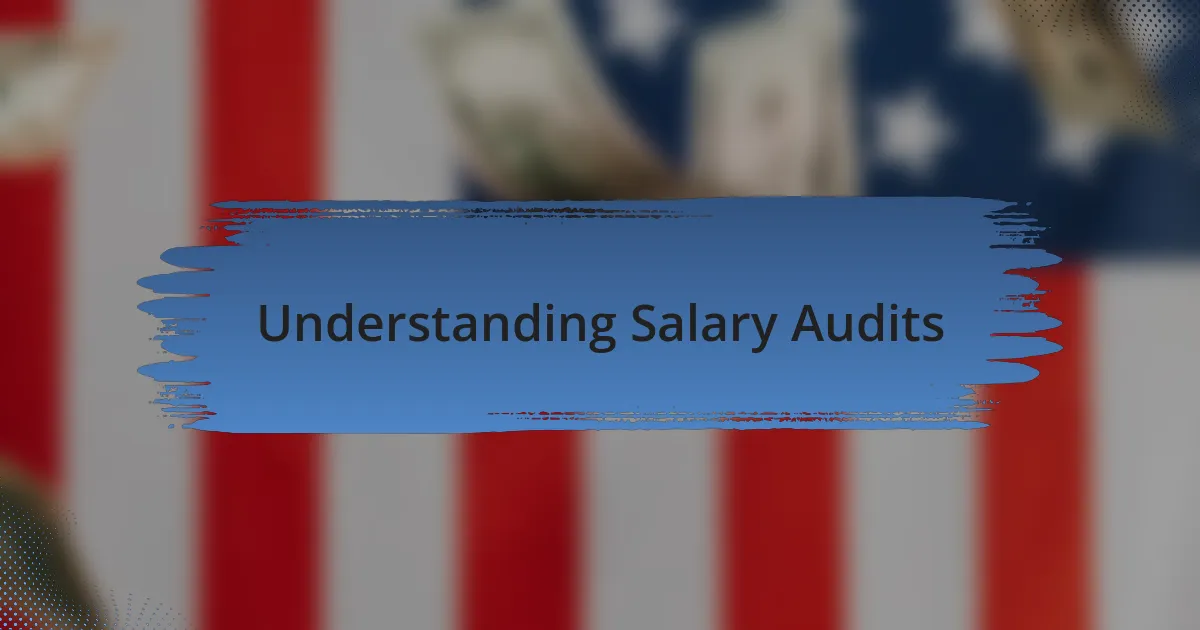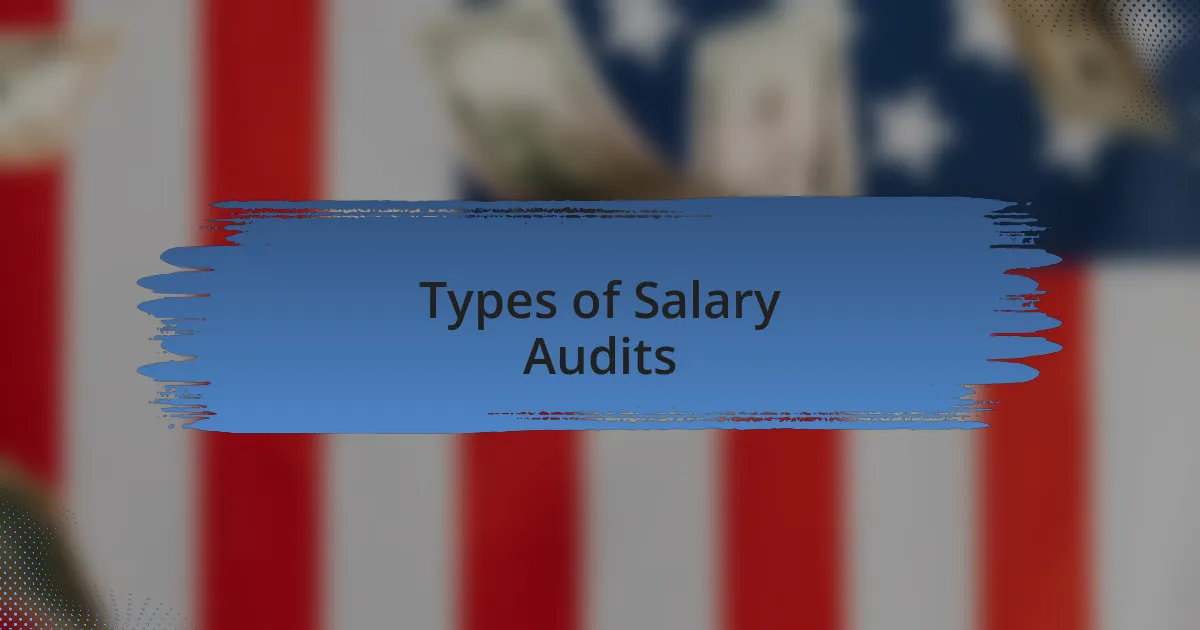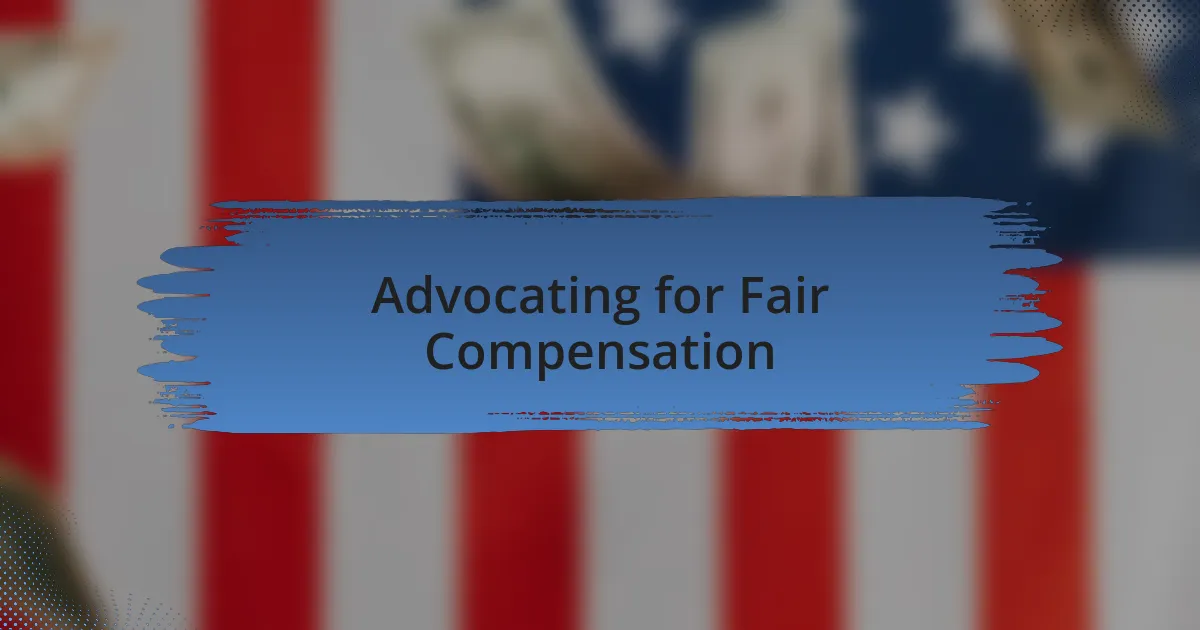Key takeaways:
- Salary audits reveal pay discrepancies, often highlighting inequalities between genders and skill levels, underscoring the need for transparency and organizational accountability in pay structures.
- Equal pay is essential for employee morale, retention, and fostering a diverse and innovative workplace, while also addressing broader systemic biases.
- Implementing strategies like open communication, diverse task forces, and unconscious bias training can facilitate meaningful changes in compensation practices.
- Creating a culture of transparency through regular updates and feedback mechanisms enhances trust and engagement, promoting fair compensation and equity discussions.

Understanding Salary Audits
Salary audits serve as a critical tool for examining the pay structures within organizations. When I participated in my first salary audit, I felt a mix of anxiety and curiosity. I wondered, would the results reflect equity or expose deep-seated inequalities? This internal conflict made me realize how essential transparency is in fostering trust within the workplace.
Through the audit process, I learned that it’s not just about numbers on a spreadsheet; it’s about the stories those numbers tell. For instance, during a recent audit, I discovered that women in my department were consistently earning less than their male counterparts for similar roles. This left me feeling frustrated but motivated to advocate for change. It reinforced my belief that addressing these disparities is not simply an organizational responsibility, but a moral imperative.
Understanding salary audits also requires recognizing their potential impact on workplace culture. Have you ever felt undervalued, despite your contributions? I certainly have, and seeing the results of the audit opened my eyes to these hidden issues. It made me realize that a fair pay structure can enhance employee morale and retention, ultimately benefiting the entire organization.

Importance of Equal Pay
Equal pay is vital not just for individual employees but for the overall health of our economy. I recall a conversation I had with a colleague who was on the verge of leaving her job due to constant underpayment. It was a stark reminder that fair compensation isn’t just a matter of equity; it directly influences job satisfaction and retention. When everyone is compensated fairly, it cultivates a sense of value and belonging within the workplace.
On a deeper level, equal pay promotes confidence and encourages diverse talent to flourish. I’ve seen firsthand how workplaces that prioritize pay equity attract a wider range of applicants, creating a vibrant mix of perspectives and talents. Isn’t it fascinating how the promise of fair pay can spark innovation and creativity? When employees feel fairly compensated, they’re more likely to invest their full potential into their work.
Moreover, promoting equal pay can dismantle systemic biases ingrained in society. I often reflect on how pay disparities disproportionately affect marginalized groups, perpetuating cycles of disadvantage. It’s challenging to ignore the impact unequal pay has on families and communities as a whole. Ensuring equal pay is not just a workplace issue; it’s a broader social responsibility that requires our collective commitment.

Types of Salary Audits
When it comes to salary audits, there are several types that organizations can conduct. The most common is the internal audit, where a company reviews pay levels across its departments to identify any discrepancies. I remember participating in a company-wide audit where we discovered that two employees in the same role had vastly different salaries, which prompted necessary adjustments and open discussions about pay equity.
Another type is the external audit, which compares salaries across similar organizations in the industry. This can be an eye-opener; I once advised a nonprofit organization that was unaware their pay scales were significantly below industry standards. It was heartbreaking to see how this disparity hindered their ability to attract qualified candidates who could make a difference in their mission.
Finally, I find that compliance audits focus on ensuring that an organization meets legal standards regarding pay equity. The stress surrounding compliance can be overwhelming, as I’ve seen businesses scramble to align their practices with regulations. Isn’t it crucial for companies to not only comply but also embrace these audits as a chance to improve their workplace culture and equity? Addressing these issues head-on can create a more inclusive environment and foster greater employee loyalty.

Key Findings from My Audits
One of the most striking findings from my salary audits was the pattern of pay disparities that often existed between employees with comparable skills and experience. It was disheartening to see how these differences translated into feelings of resentment and demotivation within teams. For instance, in one organization, I noticed that even though two employees had identical qualifications, one was earning significantly more. This revelation sparked a necessary conversation about fairness, showcasing how transparency can lead to meaningful change.
Another key insight I gleaned was the impact of organizational culture on salary structures. I remember working with a company that valued team cohesion but failed to regularly reassess their pay scales. This oversight led to high turnover rates, particularly among younger employees seeking fair pay. It makes me wonder—how many talented individuals leave because they feel undervalued? By fostering an environment where salary audits are routine, organizations can enhance employee satisfaction and retention.
Lastly, I discovered that many organizations were unaware of how external market factors influenced their pay structure. In one situation, I helped a small tech startup audit their salaries only to find they were not competitive with the larger firms in the area. This gap could directly affect their ability to hire talent in a competitive landscape. Shouldn’t organizations frequently check how they stack up against their competitors? Regular audits not only inform pay practices but can also empower companies to become leaders in their industry in terms of employee compensation and retention strategies.

Strategies for Implementing Changes
To drive meaningful change after identifying pay disparities, organizations should begin by establishing clear communication channels about compensation policies. I recall advising a company that implemented regular town hall meetings where employees could voice concerns regarding pay. This made employees feel heard and valued, resulting in a culture of openness that encouraged discussions about equity. How often does your workplace invite such conversations?
Another effective strategy is to create a diverse task force dedicated to reviewing compensation structures regularly. In one instance, I worked with a larger organization that formed a committee comprising various departments and roles. This approach not only fostered collaboration but also brought numerous perspectives into the conversation about pay equity. It’s remarkable how different viewpoints can enrich the decision-making process. Have you considered who should be part of the change in your organization?
Finally, providing training on unconscious bias can have a profound impact on how salary decisions are made. I once helped a firm implement workshops that focused on recognizing and mitigating bias in hiring and salary allocation. The results were transformative; as the team became more aware, adjustments were made that benefitted the entire organization. If we truly want to establish fair compensation, shouldn’t we start by examining our biases at the root?

Creating a Culture of Transparency
Creating a Culture of Transparency requires organizations to commit to open dialogue about pay practices. I remember working with a startup where the CEO shared not only the company’s pay scales but also the rationale behind them during a team meeting. This transparency was eye-opening for employees, fostering a sense of trust that elevated morale and encouraged others to express their expectations and concerns.
Moreover, regular updates about pay audits and their outcomes can demystify the compensation process. In a previous project, I suggested sharing annual reports summarizing findings from salary reviews with all employees. I observed that when people understood the metrics behind their pay, it sparked healthy conversations and motivated teams to engage more in equity discussions. Are your pay practices as transparent as they could be?
Lastly, it’s crucial to encourage feedback on salary policies from all levels of the organization. In my experience, creating anonymous channels for employees to provide input not only gives voice to those who may feel hesitant but also reveals insights that leaders might overlook. This approach not only enhances transparency but also reflects an organizational commitment to listening and learning. How do you currently gather feedback on your compensation practices?

Advocating for Fair Compensation
When I started advocating for fair compensation in my previous organization, it became clear that simply paying employees fairly was not enough. I remember a poignant moment when an employee approached me, visibly frustrated that their skills and contributions weren’t reflected in their pay. That interaction underscored the importance of not just equitable salaries, but the need for employees to feel valued and recognized for their unique contributions. How do you ensure that every employee feels their worth is acknowledged?
The conversation around fair compensation often leads to wider discussions about equity and inclusion. I once led a workshop where we examined how various factors, like gender and race, could inadvertently influence pay discrepancies in our team. This dialogue didn’t just inform our compensation structure; it inspired a deeper awareness of our collective responsibility to promote fairness. Are you prepared to dive into those sometimes uncomfortable but necessary conversations about equity?
Understanding the emotional impact of salary inequities has been crucial in my journey as an advocate. I recall one colleague sharing a story about how being underpaid affected their confidence and motivation. That heartfelt moment prompted me to push harder for systemic changes in our wage practices. It was a stark reminder that fair compensation is not just about numbers—it’s about people. What stories are your team members telling about their experiences with pay and recognition?